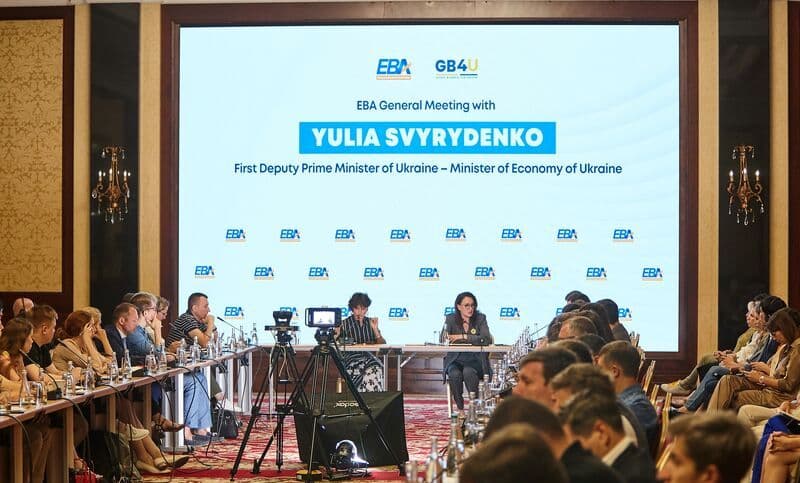The European Business Association organised the offline meeting between business and government officials to discuss a number of general and sectoral issues that are currently of concern to Ukrainian business. These included economic recovery strategies, priority sectors of recovery, war risk insurance, employee booking, public-private partnerships, and other important issues.

We share the main insights of the meeting below.
1. Global challenges that the Ministry is currently addressing.
- We are working on a draft strategy for Ukraine's recovery and development for the next 4-5 years. This should be a fundamental document that will be accepted by the European Commission and on the basis of which support for our country should be built. The Ministry encourages businesses to contribute to the development of this document and believes that the most appropriate format is when it is created in Ukraine, and external experts will be involved in verifying and working with the draft document. The First Deputy Prime Minister noted that according to the plan, the project should be ready by the end of October this year.
- The European Union's Ukraine Facility program, amounting to €50 billion for the period 2024-2027, is currently being actively discussed, but this amount will not be enough to cover all needs. Therefore, the option of raising additional funds through other channels and investments is being considered, but for this, partners need to have more information about the development plan for the Ukrainian economy, so active business participation in this process is extremely important.
- The total conceptual amount of recovery is €400 billion, which was discussed during the London conference, is also predominantly private, meaning that the standard split between private and public money is planned at 80/20.
- Ukraine currently has one of the few business support instruments in place, the “Affordable Loans 5-7-9” program, which the Government is ready to develop and amend if necessary. Approximately half of the loans under this program that have already been granted to Ukrainian businesses have gone to agricultural companies.
- Humanitarian demining. Yulia Svyrydenko noted that the most urgent issue now is to create a mechanism for fast and high-quality certification of private companies that will be engaged in humanitarian demining Currently, there is a significant lack of resources in this field. The Government's plan aims to return 80% of mined lands to circulation by 2030.
- War risks insurance is still in the process and our Government is working with the Multilateral Investment Guarantee Agency (MIGA) in this area. MIGA has already started to provide guarantees for war risks insurance from the trust fund to support the reconstruction and economy of Ukraine, and domestic companies can also apply for these guarantees. The U.S. Development Finance Corporation (DFC) has also announced the possibility of insuring domestic companies, but the process is not fast and we can expect up to 10 such projects to be implemented by the end of the year.
- Focus on import substitution and processing + grants for the processing industry, active promotion of the Ukrainian product brand both in Ukraine and abroad.
- Public-private partnership reform. Optimistically, draft law 7508 is expected to be adopted in the second reading by the end of summer. It will allow us to launch full cooperation in up to 9 months. The first pilot project with IFC is already underway.
- Creation of the e-Booking mechanism, which is currently being actively developed by the Ministry of Digital Transformation. Electronic cabinets will be established for critical enterprises, where they can submit documents and lists in electronic format. The mechanism will be controlled by the Ministry of Economy.
- The Grain corridor. Everyone is now seeing uncertainty in the Black Sea, so the Government is working with the EU to expand the capacity of alternative routes. At the same time, Ukraine's position is that Poland should lift the restrictions by 15 September (the final date), as it was announced in intergovernmental communication. The Government also plans to work on exports of metallurgy and other products.
- Currency restrictions. The Ministry of Economy is actively working with the National Bank of Ukraine on this matter, but the regulator is taking the position that the restrictions will not be lifted on schedule, but upon the achievement of certain conditions that may be presented later.
- An international register of damages will be formed in cooperation with the EU, to cover which the assets confiscated in Russia will be transferred. Those who cannot file an individual claim will be able to join a collective initiative.
2. Among the main problems voiced by businesses were
- Booking, lack of people, difficult booking procedure due to the need to work with the employee's region of registration (Oberig promised to gradually resolve this). Increase in the number of people seeking unofficial employment through military registration.
- Inability to obtain financing under the “Affordable Loans 5-7-9” program, for example, due to the lack of collateral or high risks in the frontline region. For some companies (e.g., defence industry), the program's UAH 60 million limit is not enough.
- Tax residence abroad. Businesses believe that employees who are forced to obtain foreign tax residency abroad are likely to be lost to Ukraine.
- The expiration of import declarations of the EA type on November 7th, which, according to large importers, will lead to huge queues at customs. One way out is to obtain the status of an authorized economic operator.
- Problems of certain industries: complicated procedure for registering new cars for business, falling pig iron exports to the EU, creation of a market for emissions trading, etc.
Such meetings of government representatives are extremely important for supporting the country's economy, as it is crucial for businesses to be able to ask questions directly to those who can help them solve them. We hope that similar events will be held on a regular basis, as this will undoubtedly contribute to the smooth functioning of businesses.